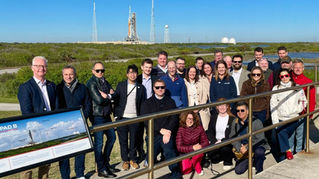Filtronic points the way ahead for companies at North East Space Conference
- Jul 1, 2025
- 3 min read
THIS year's North East Space Conference continued its ongoing work to inspire the region’s businesses to look up to the skies for their next business opportunity.
And showing hundreds of delegates how it could be done was Filtronic, the Sedgefield-headquartered radio frequency experts who have tied up eye-catching deals with industry giants SpaceX and Airbus this year.

Although the Conference does not have an official flagship example to illustrate the potential which beckons businesses, if it did, it would look very much like the success story which is Filtronic.
John Bone, chair of the North East Space Leadership group, said: “Filtronic are among the leaders in our sector and they’ve shown how we’re making the journey from talking about these things to actually doing these things.
“It’s the difference between aiming to achieve something, and actually achieving it, and I think they would acknowledge they’ve been helped by the partnerships they’ve developed in the North East, such as working with our universities.
“Filtronic and others in the North East’s space cluster have helped change perceptions of the region, which is now, rightly, regarded as a really vibrant, booming, if you like, centre for the space industry.
Filtronic were a major attraction at the Conference and regularly held up as a positive example by speakers and panellists.
As well as the company exhibiting at the Conference, this year held at the Radisson Blu hotel in Durham, Filtronic’s chief technology officer, Tudor Williams, took part in a panel discussion on ‘How did your business pivot into the space sector?’
That session provided clear advice and examples of how each business can become involved in potentially a huge growth industry for the North East.
Fin Farrelly, marketing manager at Filtronic, said: “What we do is high-performance RF, technologies such as solid-state power amplifiers - essentially, providing a way for data and communications to get from A to B, very quickly - and it’s very niche.
“We deal in very high frequency radio signals, pushing the performance boundaries in the millimetre wave section, and these global technology leaders have come to us because there are not many companies in the world that can do what we're doing.”
Previously, Filtronic utilised this expertise for terrestrial purposes, notably in the phone network, working with major infrastructure players.
Now, though, the company is moving more into the skies and, in particular, the space sector.
Fin said: “Space really wasn’t a focus when I joined Filtronic five years ago—it was very much aerospace, defence and telecoms.
“It's only in the last four years that we've become focused on space, and only in the last couple of years that things have grown into what they are today.
“Effectively, what we've done is to turn those terrestrial uses into non-terrestrial ones, so we're now doing it in space.
“It's similar technology to a large degree, but we’re putting it into new uses, and if you look at the low Earth orbit market, there are many opportunities.
“Currently, SpaceX are leading and they've got a large number of satellites still to send into orbit.
“But there are other companies and all of these low Earth orbit constellations will require infrastructure already in orbit, but also at the ground level, and increasingly at a higher frequency.”It’s exciting that so much of this pioneering work in space is being co-ordinated from Filtronic’s base on the Net Park industrial estate in Sedgefield, County Durham, (it also has sites in Leeds, Manchester and Cambridge, as well as a US manufacturing site in Maryland).
But Fin sees the North East as an increasingly appropriate setting for the space industry to find a natural fit, and he says the North East Space Conference helps focus attention on that.
“I think it's very valuable to see that the region sees the size of the opportunity,” he said.
“For us, the Conference, and the region’s space cluster, is very exciting, and it is critical to attract some of the bigger players to attend it—recently Lockheed Martin, for example - and having that kind of audience locally and regionally is really important.”
“From a recruitment perspective, getting people to the North East can be a challenge and the more like-minded organisations we have clustered together, the easier that becomes.
“It’s definitely a growth area, and it’s creating good, well-paid opportunities.
“The area already has a number of big players, creating education opportunities, focusing local schools on STEM, which can only be a good thing for the area, and we’ve also got great universities working, like Durham and Northumbria, working in this sector.
“There are good opportunities and plenty of scope for growth, as we've shown this year, and still plenty to come.”













